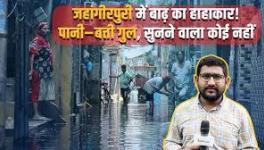Iran Turns Off 2 of UN Nuclear Watchdog's Cameras: State TV Report
Tehran: Iran turned off two surveillance cameras of the United Nations' nuclear watchdog that monitored one of its atomic sites, state television reported Wednesday.
The report did not identify the site, but it appeared to be a new pressure technique by Tehran as Western nations seek to censure Iran at a meeting this week of the International Atomic Energy Agency (IAEA).
The Iranian state television report described the two cameras as monitoring “OLEM enrichment levels and flowmeters”. That appeared to refer to the IAEA's Online Enrichment Monitors, which watch the enrichment of uranium gas through piping at enrichment facilities.
Iran currently is enriching at both its Fordo and Natanz underground nuclear sites.
“The Islamic Republic of Iran has so far had extensive cooperation with the International Atomic Energy Agency,” state TV said in its report. “Unfortunately, the agency, without considering this cooperation...not only did not appreciate this cooperation, but also considered it as a duty of Iran.”
Tehran said its civilian nuclear arm, the Atomic Energy Organisation of Iran, monitored the shutdown of the cameras. It said 80% of the existing cameras are IAEA “safeguard” cameras and they will continue to operate as before.
The Vienna-based IAEA declined to immediately comment.
Iran already has been holding footage from IAEA surveillance cameras since February 2021 as a pressure tactic to restore the atomic accord.
Iran and world powers agreed in 2015 to the nuclear deal, which saw Tehran drastically limit its enrichment of uranium in exchange for the lifting of economic sanctions. In 2018, then-President Donald Trump unilaterally withdrew America from the accord, raising tensions across the wider West Asia and sparking a series of attacks and incidents.
Talks in Vienna over Iran's tattered nuclear deal have been stalled since April. Since the deal's collapse, Iran runs advanced centrifuges and has a rapidly growing stockpile of enriched uranium. Non-proliferation experts warn Iran has enriched enough up to 60% purity -- a short technical step from weapons-grade levels of 90% -- to make one nuclear weapon if it choose.
Iran insists its programme is for peaceful purposes, though United Nations experts and Western intelligence agencies say Iran had an organised military nuclear programme through 2003.
Building a nuclear bomb would still take Iran more time if it pursued a weapon, analysts say, though they warn Tehran's advances make the programme more dangerous. Israel has threatened in the past it will carry out a pre-emptive strike to stop Iran -- and already is suspected in a series of recent killings targeting Iranian officials.
In a statement on Tuesday to IAEA, France, Germany and the United Kingdom warned the moves taken by Tehran are “further reducing the time Iran would take to break out towards a first nuclear weapon and it is fuelling distrust as to Iran's intentions”.
"The IAEA has been without crucial access to data on centrifuge and component manufacturing for a year and half now," the statement warned. “This means that neither the agency, nor the international community, know how many centrifuges Iran has in its inventory, how many were built, and where they may be located.”
The countries urged Iran “to stop escalating its nuclear programme and to urgently conclude deal that is on the table”.
But just before the camera announcement, the head of the Atomic Energy Organisation of Iran had insisted the country had no secret nuclear activity and accused the West of making a “political move” by trying to censure his country.
"Iran has had maximum cooperation with the IAEA," Mohammad Eslami said, according to the state-run IRNA news agency.
Get the latest reports & analysis with people's perspective on Protests, movements & deep analytical videos, discussions of the current affairs in your Telegram app. Subscribe to NewsClick's Telegram channel & get Real-Time updates on stories, as they get published on our website.














